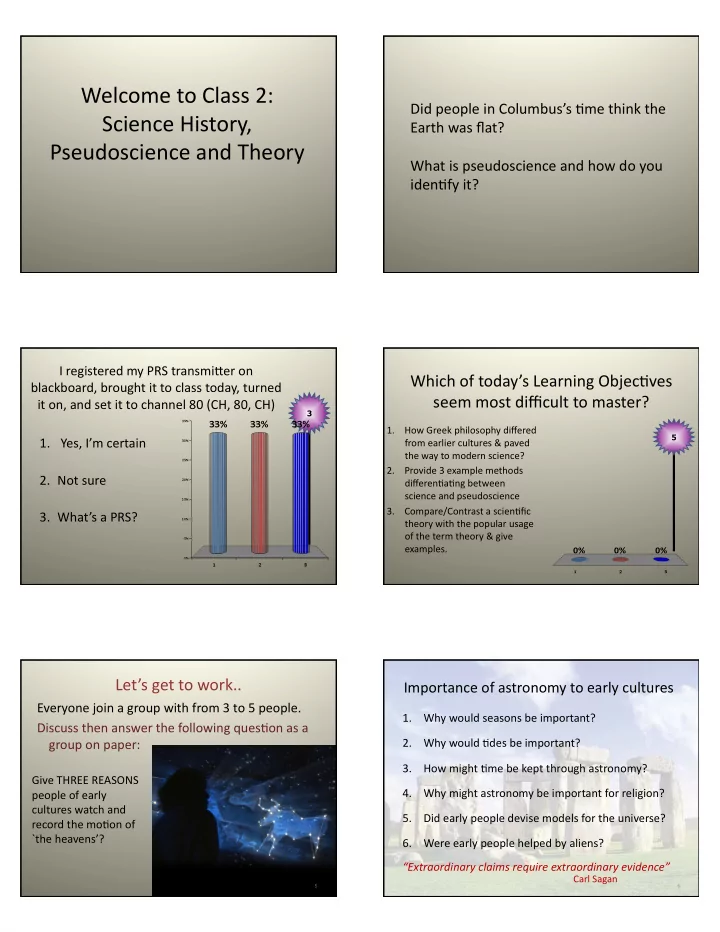

Welcome ¡to ¡Class ¡2: ¡ ¡ Did ¡people ¡in ¡Columbus’s ¡>me ¡think ¡the ¡ Science ¡History, ¡ ¡ Earth ¡was ¡flat? ¡ Pseudoscience ¡and ¡Theory ¡ What ¡is ¡pseudoscience ¡and ¡how ¡do ¡you ¡ iden>fy ¡it? ¡ 2 ¡ I ¡registered ¡my ¡PRS ¡transmiHer ¡on ¡ Which ¡of ¡today’s ¡Learning ¡Objec>ves ¡ blackboard, ¡brought ¡it ¡to ¡class ¡today, ¡turned ¡ seem ¡most ¡difficult ¡to ¡master? ¡ it ¡on, ¡and ¡set ¡it ¡to ¡channel ¡80 ¡(CH, ¡80, ¡CH) ¡ 3 1. How ¡Greek ¡philosophy ¡differed ¡ 5 1. ¡Yes, ¡I’m ¡certain ¡ ¡ ¡ ¡ ¡ ¡ ¡ ¡ from ¡earlier ¡cultures ¡& ¡paved ¡ the ¡way ¡to ¡modern ¡science? ¡ 2. Provide ¡3 ¡example ¡methods ¡ 2. Not ¡sure ¡ ¡ ¡ ¡ ¡ ¡ ¡ ¡ ¡ ¡ ¡ ¡ ¡ ¡ ¡ ¡ ¡ ¡ ¡ ¡ differen>a>ng ¡between ¡ science ¡and ¡pseudoscience ¡ 3. Compare/Contrast ¡a ¡scien>fic ¡ 3. What’s ¡a ¡PRS? ¡ theory ¡with ¡the ¡popular ¡usage ¡ of ¡the ¡term ¡theory ¡& ¡give ¡ examples. ¡ 3 ¡ 4 ¡ Let’s ¡get ¡to ¡work.. ¡ ¡ ¡ Importance ¡of ¡astronomy ¡to ¡early ¡cultures ¡ Everyone ¡join ¡a ¡group ¡with ¡from ¡3 ¡to ¡5 ¡people. ¡ 1. Why ¡would ¡seasons ¡be ¡important? ¡ Discuss ¡then ¡answer ¡the ¡following ¡ques>on ¡as ¡a ¡ 2. Why ¡would ¡>des ¡be ¡important? ¡ group ¡on ¡paper: ¡ 3. How ¡might ¡>me ¡be ¡kept ¡through ¡astronomy? ¡ Give ¡THREE ¡REASONS ¡ • 4. Why ¡might ¡astronomy ¡be ¡important ¡for ¡religion? ¡ people ¡of ¡early ¡ cultures ¡watch ¡and ¡ 5. Did ¡early ¡people ¡devise ¡models ¡for ¡the ¡universe? ¡ record ¡the ¡mo>on ¡of ¡ `the ¡heavens’? ¡ 6. Were ¡early ¡people ¡helped ¡by ¡aliens? ¡ “Extraordinary ¡claims ¡require ¡extraordinary ¡evidence” ¡ Carl ¡Sagan ¡ 5 ¡ 6 ¡
Which ¡method ¡of ¡the ¡early ¡Greeks ¡is ¡ List ¡methods ¡used ¡by ¡the ¡ not ¡accepted ¡by ¡modern ¡scien>sts? ¡ ancient ¡Greeks ¡which ¡ paved ¡the ¡way ¡for ¡ 3 1. Mathema>cs ¡ modern ¡science ¡ 2. Natural ¡explana>ons ¡ 3. Philosophical ¡thought ¡ • Individually, ¡in ¡your ¡notes ¡for ¡two ¡minutes, ¡list ¡ 4. Debate/Challenge ¡ideas ¡ three ¡of ¡their ¡methods ¡and ¡philosophies. ¡ ¡ 5. Observing ¡facts ¡ • In ¡your ¡group ¡take ¡a ¡few ¡minutes ¡to ¡compare ¡ and ¡discuss ¡what ¡you ¡each ¡wrote. ¡ 7 ¡ 8 ¡ Why ¡did ¡the ¡Greeks ¡accept ¡a ¡(wrong) ¡ Do ¡you ¡believe ¡scien>fic ¡ques>ons ¡ geocentric ¡model ¡for ¡the ¡universe? ¡ of ¡our ¡day ¡affect ¡your ¡life? ¡ Their ¡observa>ons ¡lead ¡them ¡to ¡think…. ¡ 3 Parallax, ¡clouds/birds, ¡etc. ¡: ¡The ¡earth ¡wasn’t ¡moving. ¡ 1. ¡No ¡ ¡ ¡ 2. Yes, ¡but ¡I ¡don’t ¡have ¡the ¡ The ¡heavens ¡should ¡be ¡harmonious, ¡perfect, ¡simple…. ¡ ¡ ¡ answers ¡anyway ¡ ¡ A ¡priori ¡expecta>ons: ¡the ¡`heavens’ ¡must ¡move ¡in ¡perfect ¡ circles. ¡ ¡ ¡Isn’t ¡this ¡`Occam’s ¡Razor’? ¡ 3. Yes, ¡but ¡I ¡rely ¡on ¡others ¡ as ¡to ¡what ¡to ¡believe. ¡ Did ¡the ¡Greeks ¡know ¡the ¡Earth ¡was ¡a ¡sphere ¡(not ¡flat)? ¡ 4. Yes, ¡and ¡I ¡try ¡to ¡ Yes. ¡ ¡They ¡even ¡knew ¡the ¡diameter ¡to ¡a ¡few ¡percent. ¡ understand ¡them ¡myself. ¡ (They ¡were ¡the ¡experts ¡that ¡invented ¡geometry) ¡ 9 ¡ 10 ¡ With ¡con>nued ¡ success, ¡this ¡typically ¡ leads ¡to ¡a ¡ model. ¡ If ¡this ¡course ¡helps ¡you ¡discover ¡that ¡ some ¡things ¡you’ve ¡believed ¡for ¡a ¡long ¡ Highly ¡successful ¡ models ¡can ¡ >me ¡are ¡not ¡true, ¡how ¡would ¡you ¡feel? ¡ some>mes ¡lead ¡to ¡ scien,fic ¡theories. ¡ 11 ¡ 12 ¡
A ¡scien>fic ¡Hypothesis ¡ In ¡your ¡group, ¡select ¡an ¡observa>on: ¡ • Your ¡car ¡won’t ¡start ¡ • Your ¡mother ¡doesn’t ¡return ¡your ¡phone ¡call. ¡ • An ¡educated ¡guess ¡– ¡using ¡informa>on ¡already ¡ understood ¡or ¡constrained. ¡ • Your ¡jeans ¡are ¡too ¡>ght ¡to ¡zip ¡up. ¡ • NEEDS ¡TO ¡BE ¡TESTABLE ¡or ¡make ¡a ¡PREDICTION ¡ • Everyone ¡is ¡laughing ¡at ¡you ¡as ¡you ¡enter ¡a ¡ room. ¡ • Does ¡not ¡rely ¡on ¡‘the ¡supernatural’ ¡ • You ¡woke ¡up ¡feeling ¡sick. ¡ Produce ¡3 ¡HYPOTHESIS ¡to ¡explain ¡your ¡observa>on ¡and ¡ construct ¡a ¡MATCHING ¡PREDICTION ¡to ¡test ¡each ¡one. ¡ ¡ ¡ 13 ¡ 14 ¡ Hallmarks ¡of ¡Science ¡ In ¡your ¡groups, ¡fill ¡in ¡the ¡blank ¡boxes: ¡ Science ¡ Pseudo ¡ Science ¡ Explains ¡observed ¡ Crea>on ¡and ¡tes>ng ¡ Uses ¡unnatural, ¡spiritual ¡or ¡ phenomenon ¡relying ¡ of ¡models ¡to ¡explain ¡ mys>cal ¡events ¡to ¡explain ¡ only ¡on ¡natural ¡ observa>ons ¡simply. ¡ observed ¡phenomenon. ¡ causes ¡ ¡ Creates ¡and ¡tests ¡models ¡of ¡ nature ¡to ¡explain ¡observa>ons ¡ as ¡simply ¡as ¡possible ¡ Models ¡make ¡testable ¡ Theories ¡do ¡not ¡develop ¡or ¡ predic>ons. ¡ ¡Revise ¡or ¡ change, ¡models ¡can ¡not ¡make ¡ abandon ¡models ¡if ¡not ¡ predic>ons ¡or ¡are ¡able ¡to ¡be ¡ in ¡agreement ¡with ¡ tested. ¡ observa>ons. ¡ 15 ¡ 16 ¡ Some ¡characteris>cs ¡of ¡Pseudoscience ¡ A ¡Scien>fic ¡Theory ¡ • A ¡model ¡which ¡survives ¡repeated ¡and ¡varied ¡ • ¡Claims ¡which ¡can ¡not ¡be ¡tested ¡or ¡verified ¡ tes>ng. ¡ • ¡Reliance ¡on ¡confirma>on ¡rather ¡than ¡refuta>on ¡ • ¡Lack ¡of ¡openness ¡of ¡tes>ng ¡by ¡others ¡ • Has ¡a ¡powerful ¡ability ¡to ¡predict ¡and ¡explain ¡ • ¡A ¡lack ¡of ¡progress ¡in ¡`theory’ ¡development ¡ observa>ons. ¡ ¡ • Is ¡rela>vely ¡simple*, ¡not ¡contrived ¡or ¡needing ¡ modifica>ons ¡for ¡different ¡applica>ons. ¡ • Un-‑provable ¡(can ¡not ¡be ¡proven ¡true), ¡but ¡ falsifiable ¡(can ¡be ¡proven ¡wrong). ¡ *Einstein’s ¡Theory ¡of ¡Rela>vity ¡is ¡by ¡no ¡means ¡‘simple’, ¡but ¡it ¡ is ¡a ¡single ¡set ¡of ¡equa>ons ¡applied ¡to ¡all ¡applica>ons. ¡ 18 ¡
Recommend
More recommend